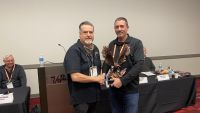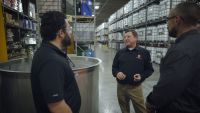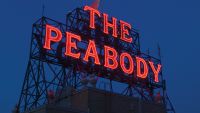Contractor to Contractor: Calvert Masonry, Inc.
By Masonry
Calvert Masonry, Inc. of Alexandria, Virginia won the Best of Show award at The Masonry Institute's design awards ceremony in November. We recently spoke with Wayne Hauter, president, and Bill Kirby, CFO, of Calvert Masonry to get an idea of their team philosophy.
Masonry: In its 18-year history, what do you think has been the key to your company's growth and success?
Calvert Masonry: I would say one of our keys to success is that we have been fortunate enough to attract a very professional management team that works extremely well together. We have always been able to promote our team atmosphere and execute on that. We also provide our clients with a quality product through our excellent management team, and that's not just with the office management, that goes for the field management too.
We continually strive to provide our clients a quality product at a reasonable price. By providing a team approach, we've always been able to meet or exceed our client's expectations with scheduling and meeting the job specifications.
Our team approach has also helped us with our General Contractors. We've been able to work on their larger projects and shown ourselves to be problem-solvers for these guys. The General Contractors seem to be looking for people who come, not only with issues, but with answers. We've built a niche for ourselves because our clients know that if there's a problem, we'll find a solution and we'll work with them as a team to get the project done, on time and under cost.
Masonry: Calvert Masonry has worked on projects ranging from $27,000 to millions of dollars. Are there are differences between working on these projects?
Calvert: Not really. We break our jobs down into individual tasks anyway. We're more oriented toward the larger jobs, because they suit our needs a lot better. We can apply our team philosophy, which is more geared toward those jobs and makes us more efficient. We break our jobs down into individual tasks and look at all problems individually. The way we approach them, there's not really a difference.
Between the project managers, estimators, and accounting staff, everybody just pulls together. Each job is assigned a group of individuals who manage it. We all work extremely well together.
Masonry: Calvert Masonry won Best of Show at The Masonry Institute's design awards in November for it's work on the Louis Stokes Health Science Library. Tell us more about this project and what you feel made it stand out as the overall winner.
Calvert: The design had a lot to do with the reason it won, but we were able to take that design and execute it. It was a difficult masonry concept. Overall, there are over 300,000 face brick. This includes 20,000 different brick in 18 special shapes, complicated arches, 6 foot high jack arches, and special lintel systems. We had to corbel out an inch and a half on each course to build a four foot high solid brick corbel in flemish bond. We really had to put a lot of thought and engineering into how to make it work.
The Best of Show award I really owe to my employees. It just shows how strong the Calvert team atmosphere really is. They took this job, they bid it on their own, they managed it on their own, and they executed it on their own. I helped them with best technology and equipment I could offer them, but really we owe that success to our employees.
Masonry: You said that it had a lot to do with the design. Would you say there was a very good cooperation and partnership between you and the architect?
Calvert: I think so. They listened to a lot of our ideas, because their original design was flawed. It just wouldn't have worked. They incorporated many of our ideas and it made the project successful.
In addition, we had to have the project done in seven months. We were working with the architects and design, thinking on-the-fly and making decisions, and had to resolve the problems as they arose. There was no time to wait and make the decision later.
Masonry: In addition to the Best in Show award, Calvert Masonry has won 17 other major awards for your projects in the last ten years. How has this affected your business and employee morale?
Calvert: As far as the individuals who work for Calvert Masonry, it's a very good morale boost, for the office and the field employees, to know that they're associated with a winning team. Everybody wants to be with the winner.
As far as our clients go, it has created some great name recognition for us. One of the first things they hear about Calvert is that we've won lots of awards and we're held in high regard in the industry. It's easier for us to sell ourselves and to sell the company.
Masonry: I see that Calvert donated time and materials on the Carpenter's Shelter project, a two-story homeless shelter that required additions and renovations. Tell us more about that project.
Calvert: The Carpenter's Shelter was important to us because it is a local shelter in our community. Our community has been good to us, so we wanted to give something back to them. We received participation from many of our suppliers, too, so it just wasn't all Calvert.
We always try to give back to the community. Each year, we set aside a certain amount of our profits for individual donations to different causes we believe in.
Masonry: Do you also take part in apprenticeship programs?
Calvert: That's very important to us, and we owe a lot of that to MCAA — we follow your apprenticeship training program. We're one of the few companies in the Washington metropolitan area that have our own in-house apprenticeship program, which is also certified.
Masonry: Calvert Masonry has a very nice website. How has it helped in your marketing and advertising for Calvert Masonry?
Calvert: The website has been a tremendous help as far as marketing and advertising. Before the website, we used to advertise in the local associations' monthly and quarterly newsletters and magazines. We still advertise, but not to the extent that we used to. Now, we have our website and anytime anybody makes any inquiries about Calvert Masonry, we just send them to our website. It really helps out and is efficient too.
We've always referred the General Contractor to the website, but also it's helped out with hiring, too. When we're advertising for new employee's or when we're interviewing prospective employees, we can direct them to the website so they can see the type of work that we do, who we work for, and size of jobs we perform. We've actually had prospective employees from all over the country e-mail us their resumes after looking at the website.
It's helped us to be more efficient overall.
Masonry: What do you feel is the biggest misconception about the masonry industry?
Calvert: I think the biggest misconception that I see is that people don't realize that masonry can be a viable career choice. Our company is made up of many individuals with different backgrounds and education levels. The masonry field can be challenging and lucrative for the individuals that apply themselves. I have been able to hire accountants, engineers and college graduates. At first pass, they may not realize that the opportunities are there, but they are. These employees can make a comfortable living in the masonry field. We offer an extensive benefits package for our employees including a retirement plan, health insurance, life insurance, dental insurance and paid leave. In general, all of our employees are making a decent living no matter what their background or educational level is.
Masonry: What would you do to change that misconception?
Calvert: Really, we are just trying to get the word out that masonry can be a very challenging and rewarding field to be in. We make it a point to attend all of the career days for the high schools, technical schools, and colleges in the local area. We participate in the local area job fairs. The associations we belong to have a career day and they will not only have masonry, but they'll have everybody in the construction industry, and we always have a representative. Many local associations will ask us first to attend their career days because they know that we promote the masonry industry, so it's good for them too.
Masonry: What are your three biggest concerns in keeping your company successful?
Calvert: One of our first major concerns is keeping everybody focused. We started out as a very small company, without a lot of resources. Keeping everybody focused on where our roots came from and not losing perspective on who makes us our money, which are our field employees. We need to make sure that our field employees have the direction, technology, equipment and safety to make them successful, which in turn will make us successful.
Another concern is being innovative with the best equipment available and to always be looking for ways to be more efficient.
My third concern is the keeping and the training of my employees. Making sure that I have the best workforce possible; continuously training the ones we have and attracting the best and most qualified prospective employees thereafter.
Masonry: Where do you think the masonry industry is going to be 10 years from now?
Calvert: I wish I really did know that one! I think masonry is evolving. With new technologies, masonry is becoming a better product. Masonry has been around for centuries and I foresee it growing in the future. They've been trying to replace masonry for years, with tilt-up walls and pre-cast, and it just keeps coming back to masonry as the one product that works and we always find better ways to do it.
I think masonry is going to be a strong industry ten years from now.
Masonry: What do you think will be the masonry industry's biggest competitor in 10 years?
Calvert: On low rise construction, concrete tilt-up walls tend to be our biggest competition. On high rise work, architect's are using glass curtain walls in many of their drawings. In the future, I believe we will still be competing with these two products as well as new products that will be lightweight and stronger.
Masonry: What do you feel are the most critical issues you'll face with future government regulations?
Calvert: Most people would answer this question with OSHA somewhere in their statement. However, we feel our biggest issue will be with the local ordinances. The local ordinances are starting to impact our ability to remain profitable on a job by dictating start times, stop times, when to work weekends, where to store materials, equipment, fuel tanks, etc. Certain local ordinances are even telling us where our employee's have to park at our expense.
Masonry: Which group do you feel has the bigger impact on masonry's future: architects, engineers or general contractors?
Calvert: Definitely architects. They have a misconception about masonry altogether. A lot of architects just haven't been designing masonry projects because they have a misconception about the cost of it.
Masonry: Do you feel that architects are trained enough in the masonry arts?
Calvert: No, they need to be educated on the different types of masonry applications. It's always helpful to enlighten the architects. Our local Nation's Capitol MCAA chapter has done an excellent job with promoting masonry to the architects.
Masonry: What do you like most about being a member of MCAA?
Calvert: The educational materials and the information that we get back from MCAA has been an excellent resource for us. We're currently utilizing your apprenticeship training program. Our safety director is always utilizing your resources for different publications and information. Additionally, the annual trade show has been a valuable networking opportunity for us.
About the Author
Masonry, the official publication of the Mason Contractors Association of America, covers every aspect of the mason contractor profession - equipment and techniques, building codes and standards, business planning, promoting your business, legal issues and more. Read or subscribe to Masonry magazine at www.masonrymagazine.com.


















